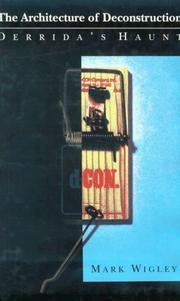| Listing 1 - 2 of 2 |
Sort by
|
Book
ISBN: 0262286203 0585003343 9780585003344 9780262286206 Year: 1993 Publisher: Cambridge, Mass. : MIT Press,
Abstract | Keywords | Export | Availability | Bookmark
 Loading...
Loading...Choose an application
- Reference Manager
- EndNote
- RefWorks (Direct export to RefWorks)
In this book Wigley redefines the question of deconstruction and architecture. By locating the architecture already hidden within deconstructive discourse, he opens up more radical possibilities for both architecture and deconstruction, offering a way of rethinking the institution of architecture while using architecture to rethink deconstructive discourse. Wigley relentlessly tracks the tacit argument about architecture embedded within Jacques Derrida's discourse, a curious line of argument that passes through each of the philosopher's texts. He argues that this seemingly tenuous thread actually binds those texts, acting as their source of strength but also their point of greatest weakness. Derrida's work is seen to render architecture at once more complex, uncanny, pervasive, unstable, brutal, enigmatic, and devious, if not insidious, while needing itself to be subjected to an architectural interrogation. Wigley provocatively turns Derrida's reading strategy back on his texts to expose the architectural dimension of their central notions like law, economy, writing, place, domestication, translation, vomit, spacing, laughter, and dance. Along the way he highlights new aspects of the relationship between Heidegger and Derrida, explores the structural role of ornament and the elusive architecture of haunting, while presenting a fascinating account of the institutional politics of architecture.
Deconstruction (Architecture) --- Deconstructivism (Architecture) --- Architecture --- Art, Architecture & Applied Arts --- Architecture, Deconstructivist --- Deconstructionism (Architecture) --- Deconstructivist architecture --- Architecture, Modern --- Philosophy. --- Derrida, Jacques --- Derrida, Jacques. --- Derrida, J. --- Derida, Žak --- Derrida, Jackes --- Derrida, Zhak --- Deridah, Z'aḳ --- Deridā, Jāka --- Dirīdā, Jāk --- Деррида, Жак --- דרידה, ז'אק

ISBN: 0262231700 Year: 1993 Publisher: Cambridge (Mass.) MIT press
Abstract | Keywords | Export | Availability | Bookmark
 Loading...
Loading...Choose an application
- Reference Manager
- EndNote
- RefWorks (Direct export to RefWorks)
In this book Wigley redefines the question of deconstruction and architecture. By locating the architecture already hidden within deconstructive discourse, he opens up more radical possibilities for both architecture and deconstruction, offering a way of rethinking the institution of architecture while using architecture to rethink deconstructive discourse. Wigley relentlessly tracks the tacit argument about architecture embedded within Jacques Derrida's discourse, a curious line of argument that passes through each of the philosopher's texts. He argues that this seemingly tenuous thread actually binds those texts, acting as their source of strength but also their point of greatest weakness. Derrida's work is seen to render architecture at once more complex, uncanny, pervasive, unstable, brutal, enigmatic, and devious, if not insidious, while needing itself to be subjected to an architectural interrogation. Wigley provocatively turns Derrida's reading strategy back on his texts to expose the architectural dimension of their central notions like law, economy, writing, place, domestication, translation, vomit, spacing, laughter, and dance. Along the way he highlights new aspects of the relationship between Heidegger and Derrida, explores the structural role of ornament and the elusive architecture of haunting, while presenting a fascinating account of the institutional politics of architecture.
Deconstructivism (Architecture). --- 1 DERRIDA, JACQUES --- Deconstructivism (Architecture) --- 72.01 --- 1 --- Derrida, Jacques --- Deconstructivisme --- Mark Wigley --- architectuur --- twintigste eeuw --- architectuurtheorie --- deconstructie --- Derrida Jacques --- Architecture, Deconstructivist --- Deconstructionism (Architecture) --- Deconstructivist architecture --- Architecture, Modern --- 1 DERRIDA, JACQUES Filosofie. Psychologie--DERRIDA, JACQUES --- Filosofie. Psychologie--DERRIDA, JACQUES --- Architectuur (theorie) --- Architectuurtheorie --- Filosofie --- Philosophy. --- Derrida, Jacques. --- Derrida, J. --- Derida, Žak --- Derrida, Jackes --- Derrida, Zhak --- Deridah, Z'aḳ --- Deridā, Jāka --- Dirīdā, Jāk --- Деррида, Жак --- דרידה, ז'אק
| Listing 1 - 2 of 2 |
Sort by
|

 Search
Search Feedback
Feedback About UniCat
About UniCat  Help
Help News
News